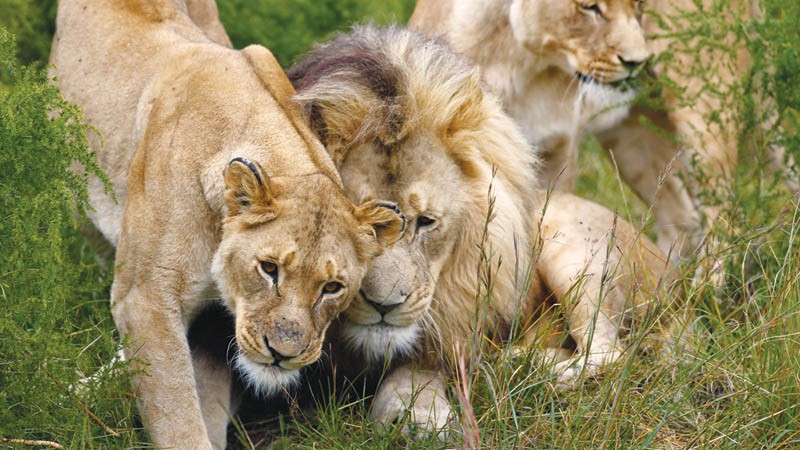Botswana lions in danger from poachers
Pini Bothoko | Friday August 11, 2017 15:45


The police have confirmed the arrest of four Batswana men allegedly behind the poaching of these lions. Mmegi has learnt that the market for lion bones is in Asia, but poachers in Botswana sell the skeletons to South Africa that seem to be supplying lion bones to meet the demand in Asia. It is believed that a lion skeleton sells for more than P30,000.
There has been international concern over the growing of South African game industry insiders who are engaged in illicit lion bone and rhino horn trade.
According to reports, the lions are killed for their bones that can be used to make fake aphrodisiacs and traditional medicines in Asia. The reports say these products are wrongfully believed to be good for arthritis and rheumatism, but also a lot of people carry the superstitious belief that it boosts the sex drive.
On their regular stop, question and search patrols the police nabbed the quartet in possession of skeletons in their car suspected to be lion bones on Sunday midnight between Middlepits and Bogogobo villages.
Middlepits station commander, assistant superintendent Batani Lehuma confirmed this.
Lehuma said they are investigating a case of lion poaching after they arrested four men in possession of bones suspected to be that of a lion.
“All of the four men, aged 30 are residents of the Kgalagadi South District. When searching their car, the police retrieved bones which we suspect might be lion bones.
We also retrieved two lion leathers from the suspects.” He stated that investigations on the matter are ongoing to establish where they were taking the bones, but looking at their magnitude they might be belonging to two lions. The top police officer said they suspect that guns were used to kill the animals.
Lehuma said they are yet to take the bones to wildlife biologist for examination as well as to establish the wild animal that the bones belong to. The suspects are likely to be arraigned before a magistrate on Monday and will be charged with hunting without a licence. In Botswana hunting a partially protected game animal such as leopard, lion, elephant, Chobe bushbuck, sable antelope and eland without a licence is an offence that attracts a fine of P5,000 and/or a five-year prison term.
Botswana also has adopted a controversial ‘Shoot-to-kill’ policy as a conservation strategy targeting poachers. It is possible if the suspects were found in the act of poaching they could have been eliminated in the spot, sources said.
He raised concern over poaching in the area despite their endless interventions in fighting and educating members of the community about poaching.
Said Lehuma: “Hunting without a licence is common in my policing area, but we have been doing community outreach programmes sensitising the community on issues of illegal hunting, but our efforts seem to fall on deaf ears”. Asked what kind of wild animals are at risk of poaching in his policing area, Lehuma revealed that there are no certain wild animals targeted by poachers in the area.
“We frequently arrest people in possession of meat belonging to different kinds of wild animals, hence cannot say poachers target certain wild animals,” Lehuma said.
Comments from the Department of Wildlife and National Parks (DWNP) and Minister of Environment, Natural Resources Conservation and Tourism (MENRCT) Tshekedi Khama were not forthcoming at the time of going to press.
Mmegi had wanted to establish the impact of lion bone trade on the population of these cats in Botswana. It also wanted to know the population of lions in the country.
Conservationists
disapprove trade in lion bone
There was anger in October 2016 when Convention on International Trade in Endangered Species (CITES) Committee in South Africa approved the trade in lion bones and set quotas for the selling of bones of captive lions.
‘Blood Lions’ documentary makers expressed embarrassment on those who voted for this approval. ‘Blood Lions’ is the film that exposed the canned lion hunting industry in South Africa.
It said: “Thousands of captive lions in South Africa will be thrown to the lion bone traders”. Last month, Dr Paul Giess wrote that the recent announcement by the Department of Environmental Affairs (DEA) to set the export quota of lion skeletons for Asia to 800 has important implications for the conservation of wild lions in South Africa.
Writing for Green Girls in Africa he said legalising the trade in lion bones has been enabled by the 17th Conference of Parties (CoP17) of CITES failing to transfer all lion populations from Appendix II to Appendix I and thus prohibiting the international commercial trade in lions or any lion parts.
He wrote: “It is estimated that there are less than 20,000 wild lions left throughout Africa, with a population decline of more than 40% in the past two decades.
The wild lion population is at a similar tipping point as the white rhino and is fast tracking towards extinction.
The main cause of lion population decline is habitat loss, with the constant encroachment of human activity into wild areas increasingly bringing humans and wildlife into conflict.”
He added that the captive breeding of lions for the purpose of killing them to supply the bone trade is “considered by many to be ethically unacceptable” and “has the potential to harm South Africa’s global image”.
Giess explained that China banned the use of tiger parts in traditional Chinese medicine in 1993 in recognition of the negative perceptions of killing iconic wildlife for scientifically unproven treatments.
In conclusion he wrote: “In addition, legalising lion bone trade will encourage further captive lion breeding and its associated unethical wildlife interactions, such as cub petting, lion-walking and volunteering, when the impact of the Blood Lions documentary and campaigns, such as #HandsOffOurWildlife and Wildlife Not Entertainers, is slowly but surely starting to make some headway”.
